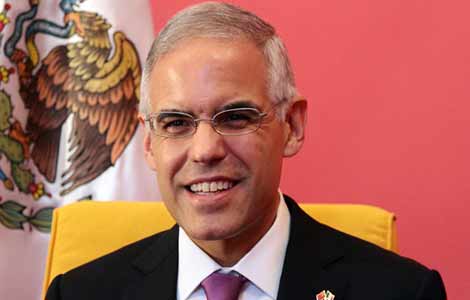Kenya calls for concerted efforts to save elephants
Updated: 2013-09-21 09:27
(Xinhua)
|
||||||||
NAIROBI - Kenya's First Lady Margaret Kenyatta on Friday called for increased support in order to save elephants which are being slaughtered at a high rate.
Speaking at an anti-poaching campaign at the Amboseli National park, Margaret said the government has shown essential political goodwill and support in the fight against ivory trade to save elephants and other endangered species.
"We are inviting everyone to help us protect the elephants. The world is a global village; the demand for ivory comes from countries far away. We need to work together to save the elephants, " she said.
The First Lady's remarks came as wildlife activists have launched PoachersExposed.com, an online campaign aimed at naming and shaming poachers in the East African nation and help in the fight against the menace.
The Kenya United Against Poaching (Kuapo) said the launch of the online campaign was motivated by the spike in killings of 100 elephants each year in Kenya, noting that the campaign will show charged or convicted people with links to poaching.
PoacherExposed allows informers to do so confidentially and hopes the information will reveal patterns of conviction by region, court and magistrates.
"There are concerns that along the chain there are issues of evidence not being collected properly to judges not fully understanding the impact of the crime, to leniency and corruption, " Chandra said.
Photos will be posted along with name, where available, alongside court case information or charge sheet.
Margaret called for the need for the law to provide for stiffer penalties to deter poaching which was a major threat to the country's economy, stability and natural heritage.
"We must all be concerned by the impact of poaching. The only people who benefit from ivory trade in Kenya today are a handful of criminals. I am leading the campaign for the future, for my children. Imagine Kenya without elephants. All Kenyans must say no to poaching." she said.
Statistics from the Kenya Wildlife Service (KWS) showed that 3 percent of overall wildlife tourism earnings are now being redirected to the treatment of wounded elephants and catering for orphaned calves.
Margaret emphasized the need for communities involved in wildlife conservation efforts to benefit directly from their noble efforts.
She said communities must benefit from protecting wildlife as an incentive for them to appreciate the importance of peaceful co- existence with wild game in their private ranches and minimize conflicts between wildlife and human.
The Kenyan government in August launched an elite paramilitary force to boost the fight against poaching that is to blame for a decline in population of elephants and rhinos in the east African nation.
The new anti-poaching crack unit comprises officers drawn from specialized units of the Kenya Wildlife Service, Administration police and the General Service Unit.
The specialized anti-poaching squad will undergo a three-week training, to be equipped with skills and knowledge on fighting wildlife crimes that have escalated in Kenya's vast jungles.
The East African nation has also fast-tracked the implementation of an action plan to fight poaching of elephants in response to the convention on international trade in endangered species (CITES).
Margaret, who is at the forefront in the campaign against poaching and is passionate on wild game conservation, said elephants are a global heritage and should be protected for posterity.
She said elephants at the park are individually known by names like human beings, adding that communities must benefit for real from protecting our wildlife.
"This campaign is aimed at creating a national understanding of the elephants to show the connection between conservation and sustainable livelihoods," she said.
Conflict between land for wildlife and land for farmers and pastoralists in Kenya has also reached crisis level with rampant killing of lions and elephants among other types of important wildlife.
The First Lady lauded the communities adjacent to national parks and game reserves for the frontline role they played in the protection of wild animals roaming private land during their daily and seasonal migrations.
The game park has its ecosystem spreading across the Kenya- Tanzania border and is recognized by UN Education, Science, Cultural Organization (UNESCO) as a Biosphere Reserve due to its richness in flora and fauna.

 In pictures: Nairobi mall shooting spree
In pictures: Nairobi mall shooting spree
 Liaoning carrier completes its furthest sea trial
Liaoning carrier completes its furthest sea trial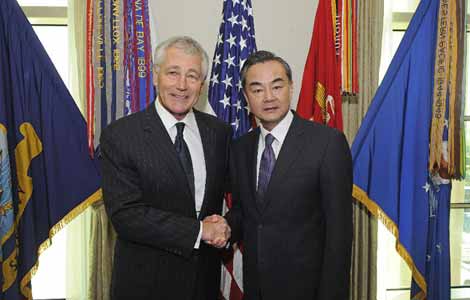
 China, US applaud improvement of military ties
China, US applaud improvement of military ties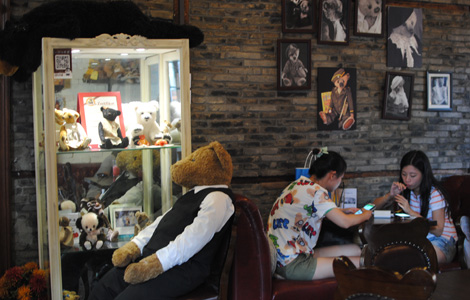
 Two family-style eateries are where animals roam
Two family-style eateries are where animals roam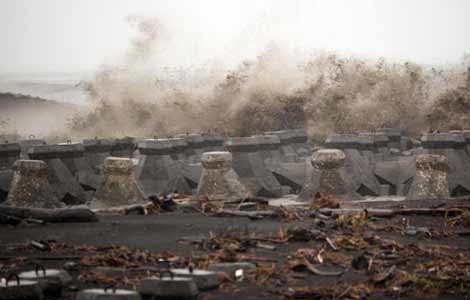
 China braces for super typhoon Usagi
China braces for super typhoon Usagi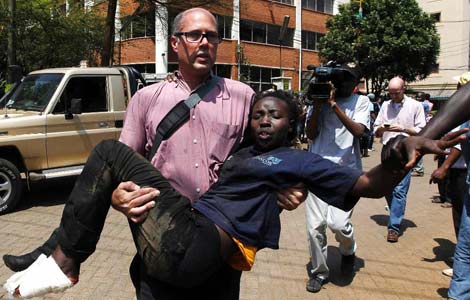
 Islamists claim gun attack on Nairobi mall, 39 dead
Islamists claim gun attack on Nairobi mall, 39 dead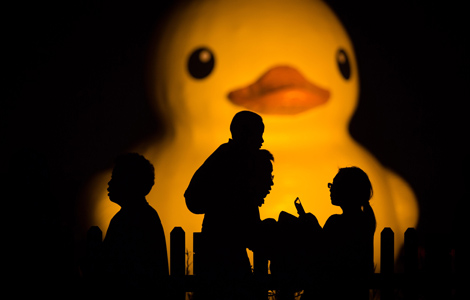
 In the best possible taste?
In the best possible taste?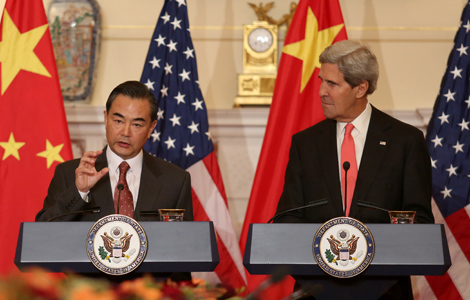
 Action pledged for new type of Sino-US ties
Action pledged for new type of Sino-US ties
Most Viewed
Editor's Picks

|

|

|

|

|

|
Today's Top News
China braces for super typhoon Usagi
Explosive criminal cases drop in China
New Sino-US ties sought
Trending news across China
Bo Xilai verdict to be announced
Islamists claim gun attack in Nairobi
China sees drop in donations
Charges against Saudi princess in US dismissed
US Weekly

|

|

